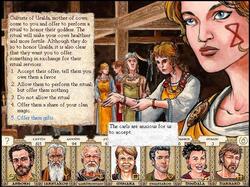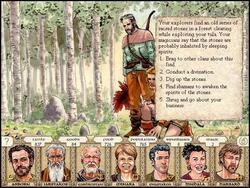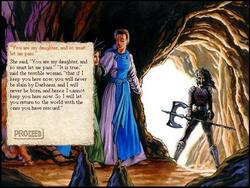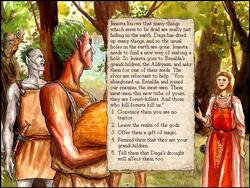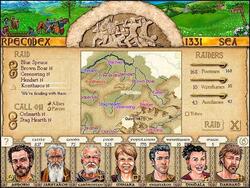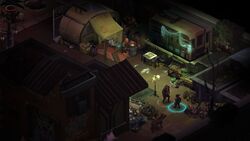Forgotten Gems: King of Dragon Pass Review
Forgotten Gems: King of Dragon Pass Review
Review - posted by JarlFrank on Thu 22 November 2007, 20:20:05
Tags: A Sharp; King of Dragon PassJarlFrank reviews this '99 gem. Although a first glance might make you suspect this is a management strategy game, JarlFrank has no problem claiming this is, in fact, a genre-bender with such a large dose of the RPG design elements we all love that it belongs in our review repertoire and that you should play this game. Read his short & sweet review to find out why.
Read the full article: Forgotten Gems: King of Dragon Pass quickie review
Read the full article: Forgotten Gems: King of Dragon Pass quickie review
King of Dragon Pass is a pretty unknown game that sadly hasn't recieved as much attention as it would have deserved. Its text-driven gameplay and lots of choice and consequence make it a pretty unique game. Some people might have heard of it, but it's still rather obscure and unknown by most. So what is it all about? Let’s have a look at the game’s history first.
A small company called A# (spoken: A-Sharp) made this game back in 1999, but sadly it's hard to obtain a copy nowadays. Their official site might be a place to check for it, but even there you might not be able to get it anymore. Enough about its availability, let's talk about the game itself, which I would call a masterpiece.
So, what's it about? It's hard to put the game within pre-defined genre borders. It begins with you picking the history of your clan by getting told of events and choosing what your ancient clan did during those events, what they decided to do. Your choices here will affect several basic characteristics of your clan, like what god they worship as their main god, what race are their worst enemies and how much land they start with. Most of it isn’t crucial for the gameplay, the disposition of your clan towards slavery being a notable exception, but it adds flavor and increases replayability by giving you a certain freedom in creating your clan.
After creating your clan you’re thrown right into the action. There’s supposed to be a tutorial, but there’s no real difference between the turorial and the real game, except that you cannot create your own clan in the tutorial. I haven’t seen any real differences, and no hints on how to play the game at all, so learning to play is mainly done by trial and error. You’ll get the hang of it after a while, I didn’t find the learning curve to be all that steep. You’re not entirely on your own exploring the world of King of Dragon Pass, either. You have several advisors on your side, who are composed of some of your nobles and will always have useful hints and tips for you, as well as just telling you their own opinion about something or suggesting a possible solution for a problem – which isn’t necessarily the best way to solve a given situation.
Now, having advisors is good and all that, but what are you actually doing in that game? As the leader of your clan you have to make decisions to make your clan prosper, like:
- Trading with other clans
- Deciding how much land is used for planting crops and how much for your cattle
- Building fortifications and temples.
Most of this is done with sliders and menus. The interface is not that complex and generally works well. It works a lot like a strategy or management game. Each year you will get a summary of what your clan achieved. This report includes things like how many babies were born, how much food produced, how many people died and how much more cattle your clan has .
Managing your clan’s economy is fun, but it’s not the most important and unique part of the game. The thing that makes this game what it is are the special events and the exploration aspect. When you send one of your nobles to go exploring, he will travel to the place you sent him to, and once he arrives (this might take a few turns, depending on how far away the goal is) you will be presented with a nice little screen depicting the situation, a description and multiple choices on what to do.
For example, your explorers have found a strange artifact on your own Tula (that’s how the land is called that is under possession of your clan) and wonder what to do with it. You can decide to just leave it be, take it with you and boast with it, sell it to another clan or even give it to another clan as a present to better your relations with them. Exploring different parts of the world can lead to some pretty interesting situations which are all solved through multiple choice windows. Some of the consequences will be obvious right away, while others take their time to come in effect. Now, to the special events. They are the meat of the game. They are what makes this game beautiful. They are the reason why it feels so unique, and plays more like an RPG where you play the role of a clan leader than just a simple strategy game. Each of these events brings a ton of choices, all of which have consequences. In these events, literally anything can happen, and many of them depend on how you manage your clan. For example, your warriors could come to you and demand more attention because they feel neglected by you. You can then promise to treat them better in the future, convince them that they’re wrong or hold a feast for them. There are many such internal events, as well as recurring events like a certain group of priests visiting your village. But then there are also the unique events, like a dragon coming to you and asking you what’s most important for your tribe – and, depending on your answer, you will recieve a certain benefit when he returns… which can take a long time, so be prepared to be hit by a consequence to one of your actions at a time when you’ve already forgotten what you actually did back then. Consequences in this game range from small effects to huge effects, from beneficial to devastating. Your clan can be wiped out by a horde of beastmen because you’ve been getting on their nerves too much in the past, or the artifact you’ve been given by some adventurers to guard for several years can turn out to attract enemies like honey attracts flies. Indeed, those events, with all their choices and consequences, are what make this game interesting and unique, and no two playthroughs are alike. Furthermore, the consequences can sometimes even unfold over multiple other events and affect whole event-chains. Sometimes you’ll see that a seemingly small choice you made long ago has affected your whole game now. Not only the relevance of those events is what makes them such an important part of the game, it’s also their quantity. They happen almost every second turn, and make up the largest part of the gameplay. Changing sliders in the management windows can also bring forth some more events. Clearing the forest to farm more grain? You will be visited by a fox that tells you to stop destroying the forest, or the nature spirits will take revenge on you by giving you bad luck for a year. You should expect almost everything you do to bring forth a new event, and you should always keep in mind that one wrong decision there can have worse effects than bad clan management.
But the events are not the only unique thing about the game. It also contains a concept called Heroquests, which, have you send one of your nobles into the realm of the gods and re-enact an old saga. The way to success in these is mostly to read the saga thoroughly, then pick a noble with good stats that improve his or her chance to successfully go through the Heroquest, without dying. They’re played out in a multiple-choice menu-driven interface, just like the events and exploration, but the problem with the former is that they’re always the same, and thus get pretty predictable after playing through them once. When you complete a Heroquest for the first time, you’ll know which answers lead to the best results and can exploit this knowledge to embark on the same quest several times just to reap the benefits. The Heroquests are written in an interesting way, though, and add a lot to the game’s atmosphere as well as providing some nice background information about the setting.
So, what else to mention about it? Well, there’s also combat, but it’s nowhere as detailed as the rest of the game. You just decide what clan to attack (unless someone’s attacking you), choose general tactics (skirmish, charge, maneuver), the goal of the battle (plunder, take prisoners, burn some buildings, or just kill as many as possible) and send your warriors to the fight. This is as far as your control over combat goes. Sometimes something special might happen during the fight to which the leading general has to react, which is, again, done by a multiple choice menu. Your decision there can lead either to victory or defeat, so you should choose wisely and know the strengths and weaknesses of your leading noble.
So far I’ve been gushing about this game, but of course, King of Dragon Pass has some flaws, most of which are easy to overlook. The only thing I didn’t really like was the lack of control over combat, which makes results somewhat random. A menu driven combat system similar to the way events are handled would have been a nice thing to add. Some of the events can become predictable after a while, especially the recurring ones, and after a while you know which choice gives you the best results. As I’ve already pointed out, the Heroquests are easy to solve once you’ve played through them once. Permutations and some non-linearity in them would’ve been nice. Another problem with the game is that the learning curve is pretty steep, and that even hours into the game you can still be completely fucked up by making a single bad call. The game is harsh and unforgiving, especially to inexperienced players, and knowing what’s the best way to lead your clan can take a lot of time and many lost campaigns. You might get the hang of the interface pretty quickly, but the gameplay itself is hard to master and it takes some time until you can really think yourself into the role of a chieftain and act accordingly, which is the best way to victory.
And indeed, the game feels more like a roleplaying game than strategy or management. Managing internal or diplomatic matters doesn’t just work through numbers and sliders, but through events in which you, as a chieftain, are addressed and have to make a choice. All the special events add to the feeling of playing the role of a chieftain rather than playing a strategy game, as many events touch your character on a personal level and make you identify with the role of the clan leader.
All in all, I’d name it a classic and have no trouble recommending it. The artstyle and graphics are wonderful, everything is made up of static paintings which manage to carry over the setting’s atmosphere perfectly. I found the music to be fitting. It seemed to have such a fuzzy „old game“ atmosphere, similar to old DOS classics. The unique gameplay makes up for its flaws, and the high difficulty only adds to the challenge. It’s also very much possible to play the game sandbox-style, creating new clans and just trying to reach a self-set goal, without ever starting the main quest of forming a kingdom. It’s unique, it’s interesting, and it’s a fun game that you should definitely try out, if only to see that a game can transcend genre boundaries and become something special.
A small company called A# (spoken: A-Sharp) made this game back in 1999, but sadly it's hard to obtain a copy nowadays. Their official site might be a place to check for it, but even there you might not be able to get it anymore. Enough about its availability, let's talk about the game itself, which I would call a masterpiece.
So, what's it about? It's hard to put the game within pre-defined genre borders. It begins with you picking the history of your clan by getting told of events and choosing what your ancient clan did during those events, what they decided to do. Your choices here will affect several basic characteristics of your clan, like what god they worship as their main god, what race are their worst enemies and how much land they start with. Most of it isn’t crucial for the gameplay, the disposition of your clan towards slavery being a notable exception, but it adds flavor and increases replayability by giving you a certain freedom in creating your clan.
After creating your clan you’re thrown right into the action. There’s supposed to be a tutorial, but there’s no real difference between the turorial and the real game, except that you cannot create your own clan in the tutorial. I haven’t seen any real differences, and no hints on how to play the game at all, so learning to play is mainly done by trial and error. You’ll get the hang of it after a while, I didn’t find the learning curve to be all that steep. You’re not entirely on your own exploring the world of King of Dragon Pass, either. You have several advisors on your side, who are composed of some of your nobles and will always have useful hints and tips for you, as well as just telling you their own opinion about something or suggesting a possible solution for a problem – which isn’t necessarily the best way to solve a given situation.
Now, having advisors is good and all that, but what are you actually doing in that game? As the leader of your clan you have to make decisions to make your clan prosper, like:
- Trading with other clans
- Deciding how much land is used for planting crops and how much for your cattle
- Building fortifications and temples.
Most of this is done with sliders and menus. The interface is not that complex and generally works well. It works a lot like a strategy or management game. Each year you will get a summary of what your clan achieved. This report includes things like how many babies were born, how much food produced, how many people died and how much more cattle your clan has .
Managing your clan’s economy is fun, but it’s not the most important and unique part of the game. The thing that makes this game what it is are the special events and the exploration aspect. When you send one of your nobles to go exploring, he will travel to the place you sent him to, and once he arrives (this might take a few turns, depending on how far away the goal is) you will be presented with a nice little screen depicting the situation, a description and multiple choices on what to do.
For example, your explorers have found a strange artifact on your own Tula (that’s how the land is called that is under possession of your clan) and wonder what to do with it. You can decide to just leave it be, take it with you and boast with it, sell it to another clan or even give it to another clan as a present to better your relations with them. Exploring different parts of the world can lead to some pretty interesting situations which are all solved through multiple choice windows. Some of the consequences will be obvious right away, while others take their time to come in effect. Now, to the special events. They are the meat of the game. They are what makes this game beautiful. They are the reason why it feels so unique, and plays more like an RPG where you play the role of a clan leader than just a simple strategy game. Each of these events brings a ton of choices, all of which have consequences. In these events, literally anything can happen, and many of them depend on how you manage your clan. For example, your warriors could come to you and demand more attention because they feel neglected by you. You can then promise to treat them better in the future, convince them that they’re wrong or hold a feast for them. There are many such internal events, as well as recurring events like a certain group of priests visiting your village. But then there are also the unique events, like a dragon coming to you and asking you what’s most important for your tribe – and, depending on your answer, you will recieve a certain benefit when he returns… which can take a long time, so be prepared to be hit by a consequence to one of your actions at a time when you’ve already forgotten what you actually did back then. Consequences in this game range from small effects to huge effects, from beneficial to devastating. Your clan can be wiped out by a horde of beastmen because you’ve been getting on their nerves too much in the past, or the artifact you’ve been given by some adventurers to guard for several years can turn out to attract enemies like honey attracts flies. Indeed, those events, with all their choices and consequences, are what make this game interesting and unique, and no two playthroughs are alike. Furthermore, the consequences can sometimes even unfold over multiple other events and affect whole event-chains. Sometimes you’ll see that a seemingly small choice you made long ago has affected your whole game now. Not only the relevance of those events is what makes them such an important part of the game, it’s also their quantity. They happen almost every second turn, and make up the largest part of the gameplay. Changing sliders in the management windows can also bring forth some more events. Clearing the forest to farm more grain? You will be visited by a fox that tells you to stop destroying the forest, or the nature spirits will take revenge on you by giving you bad luck for a year. You should expect almost everything you do to bring forth a new event, and you should always keep in mind that one wrong decision there can have worse effects than bad clan management.
But the events are not the only unique thing about the game. It also contains a concept called Heroquests, which, have you send one of your nobles into the realm of the gods and re-enact an old saga. The way to success in these is mostly to read the saga thoroughly, then pick a noble with good stats that improve his or her chance to successfully go through the Heroquest, without dying. They’re played out in a multiple-choice menu-driven interface, just like the events and exploration, but the problem with the former is that they’re always the same, and thus get pretty predictable after playing through them once. When you complete a Heroquest for the first time, you’ll know which answers lead to the best results and can exploit this knowledge to embark on the same quest several times just to reap the benefits. The Heroquests are written in an interesting way, though, and add a lot to the game’s atmosphere as well as providing some nice background information about the setting.
So, what else to mention about it? Well, there’s also combat, but it’s nowhere as detailed as the rest of the game. You just decide what clan to attack (unless someone’s attacking you), choose general tactics (skirmish, charge, maneuver), the goal of the battle (plunder, take prisoners, burn some buildings, or just kill as many as possible) and send your warriors to the fight. This is as far as your control over combat goes. Sometimes something special might happen during the fight to which the leading general has to react, which is, again, done by a multiple choice menu. Your decision there can lead either to victory or defeat, so you should choose wisely and know the strengths and weaknesses of your leading noble.
So far I’ve been gushing about this game, but of course, King of Dragon Pass has some flaws, most of which are easy to overlook. The only thing I didn’t really like was the lack of control over combat, which makes results somewhat random. A menu driven combat system similar to the way events are handled would have been a nice thing to add. Some of the events can become predictable after a while, especially the recurring ones, and after a while you know which choice gives you the best results. As I’ve already pointed out, the Heroquests are easy to solve once you’ve played through them once. Permutations and some non-linearity in them would’ve been nice. Another problem with the game is that the learning curve is pretty steep, and that even hours into the game you can still be completely fucked up by making a single bad call. The game is harsh and unforgiving, especially to inexperienced players, and knowing what’s the best way to lead your clan can take a lot of time and many lost campaigns. You might get the hang of the interface pretty quickly, but the gameplay itself is hard to master and it takes some time until you can really think yourself into the role of a chieftain and act accordingly, which is the best way to victory.
And indeed, the game feels more like a roleplaying game than strategy or management. Managing internal or diplomatic matters doesn’t just work through numbers and sliders, but through events in which you, as a chieftain, are addressed and have to make a choice. All the special events add to the feeling of playing the role of a chieftain rather than playing a strategy game, as many events touch your character on a personal level and make you identify with the role of the clan leader.
All in all, I’d name it a classic and have no trouble recommending it. The artstyle and graphics are wonderful, everything is made up of static paintings which manage to carry over the setting’s atmosphere perfectly. I found the music to be fitting. It seemed to have such a fuzzy „old game“ atmosphere, similar to old DOS classics. The unique gameplay makes up for its flaws, and the high difficulty only adds to the challenge. It’s also very much possible to play the game sandbox-style, creating new clans and just trying to reach a self-set goal, without ever starting the main quest of forming a kingdom. It’s unique, it’s interesting, and it’s a fun game that you should definitely try out, if only to see that a game can transcend genre boundaries and become something special.
There are 6 comments on Forgotten Gems: King of Dragon Pass Review







